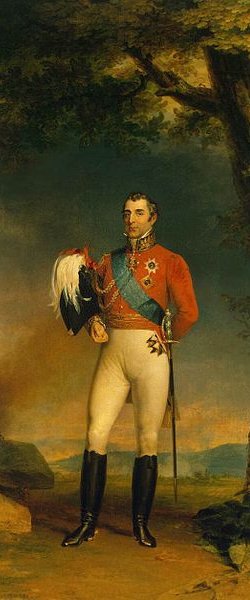Topic: British Army
The Duke and His Soldiers
The Duke, by Philip Guedalla, 1931 (Wordsworth Military Library Edition 1997)

Portrait of Duke of Wellington, by George Dawe
Few themes, indeed, moved [Wellington] to eloquence except the imperfections of his human instruments. But there his language often verged on the sublime. Unwearying himself, he was unmerciful in his comments upon lack of energy in others; and exasperation frequently betrayed him into unpardonable generalisations. A fixed belief that insufficient inducements were offered to recruits had led him to the conclusion that " none but the worst description of men enter the regular service"; and from this premise he proceeded to the gravest disparagements of the men under his command. "The scum of the earth," he termed them, "the mere scum of the earth… The English soldiers are fellows who have all enlisted for drink — that is the plain fact—they have all enlisted for drink." This tone became habitual with him in later years, as a congenial antidote to the prevailing cant. For Wellington could not bear his hearers to be romantic about soldiers—" people talk of their enlisting from their fine military feeling—all stuff—no such thing. Some of our men enlist from having got bastard children—some for minor offences—many more for drink; but you can hardly conceive such a set brought together, and it really is wonderful that we should have made them the fine fellows they are." They were fine fellows, then. He was prepared to admit as much; and for seven years in the Peninsula he toiled to make them so. Seven volumes of General Orders, drafted in his own handwriting and traced endlessly across the paper with " the short glazed pens " from Tabart's in New Bond Street, testify to his parental care. Crime is duly present; the crackle of illicit pig-shooting is heard; bee-hives are purloined; and the misdeeds peculiar to military operations in wine-producing countries stalk through his pages. But camp-kettles, shirts, and brushes haunted him; his dreams were full of army biscuit; and his housekeeping anxieties arc in strange contrast with the grave ablatives absolute of Ceasar or Napoleon's baroque eloquence. Supply was still the burden of his severely humdrum song. He still insisted that "it is very necessary to attend to all this detail, and to trace a biscuit from Lisbon into the man's mouth on the frontier, and to provide for its removal from place to place, by land or by water, or no military operations can be carried on, and the troops must starve." Even his strategy was dominated by the practical consideration that "a soldier with a musket could not fight without ammunition, and that in two hours he can expend all he can carry."

